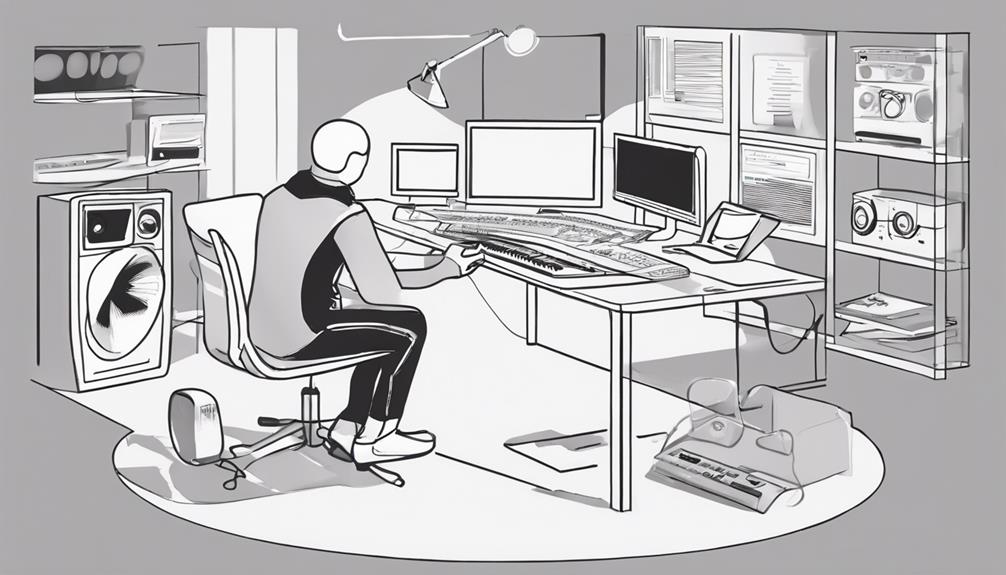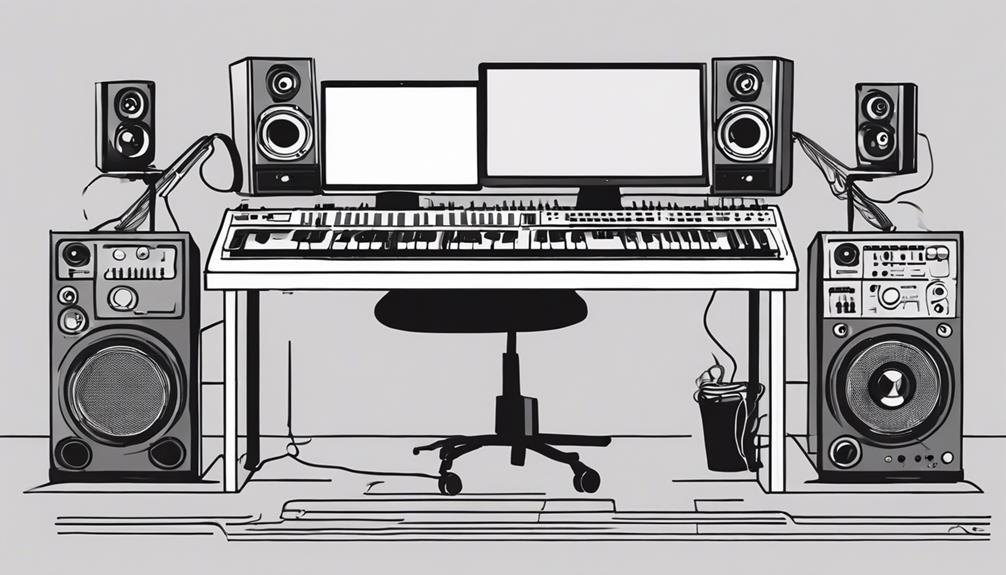Creating a music production company involves steps like market research, securing start-up capital, and identifying your target audience. Choose a suitable business structure and ensure legal compliance with licenses and permits. Select ideal recording locations and focus on strong marketing strategies including an online presence. Network within the industry and develop a robust project pipeline. Each step is essential for success in the dynamic music business landscape. Establishing a music production company also requires investing in high-quality equipment and assembling a skilled team of audio engineers, producers, and creative talent. Building strong relationships with artists, record labels, and distributors can further boost credibility and expand opportunities. By maintaining adaptability and staying updated on industry trends, you can ensure the long-term growth and sustainability of your music production venture.
Key Takeaways
- Conduct market research to identify target audience and tailor services.
- Secure start-up capital from various sources for financial stability.
- Choose appropriate business structure and obtain necessary licenses.
- Select a strategic recording location with proper setup for production.
- Develop marketing strategies, online presence, and industry connections for growth.
Market Research
Conduct surveys and focus groups to gain insights into the preferences of your target market for music production services. By tapping into these research methods, you can uncover valuable information about what your potential clients truly desire when it comes to music production. Understanding their preferences will enable you to tailor your services to meet their specific needs effectively.
In addition, it's essential to analyze the spending habits of potential clients to determine the appropriate pricing and service offerings. This data will help you align your pricing strategy with what your target market is willing to pay for high-quality music production services.
Moreover, utilizing observation methods will allow you to gather firsthand insights into the needs and wants of consumers in the music production industry. By closely observing consumer behavior, you can identify trends and preferences that will guide your business decisions.
Start-Up Capital

To establish your music production company successfully, you must secure the necessary start-up capital, which can vary considerably based on the scale and scope of your business. The start-up capital for a music production company can range from a few thousand dollars to millions.
Sources of start-up capital may include personal savings, loans from financial institutions, angel investors, venture capitalists, or crowdfunding. Proper allocation and management of this capital are vital for establishing and growing your company. The amount needed will depend on factors such as equipment costs, studio rental fees, licensing fees, marketing expenses, and potential payroll.
Understanding the financial requirements of starting a music production company is essential for creating a realistic budget and financial plan. By carefully evaluating your needs and exploring various funding options, you can make sure that you have the necessary resources to launch and sustain your music production venture successfully.
Identify Niche Market

In order to establish a successful music production company, pinpointing a specific target audience within the music industry is essential. Your niche market could include independent artists, record labels, or advertising agencies.
Conduct thorough market research to understand the needs and preferences of your target market. Assess the size and growth potential of your niche market to determine the business opportunity it presents. Analyze the competition within your niche market and pinpoint ways to differentiate your music production company.
Tailor your services and marketing strategies to cater to the unique demands of your identified niche market. By focusing on a specific segment of the music industry, you can more effectively meet the needs of your clients and stand out in a crowded market.
Understanding and serving your niche market will be vital in building a successful music production company.
Business Structure
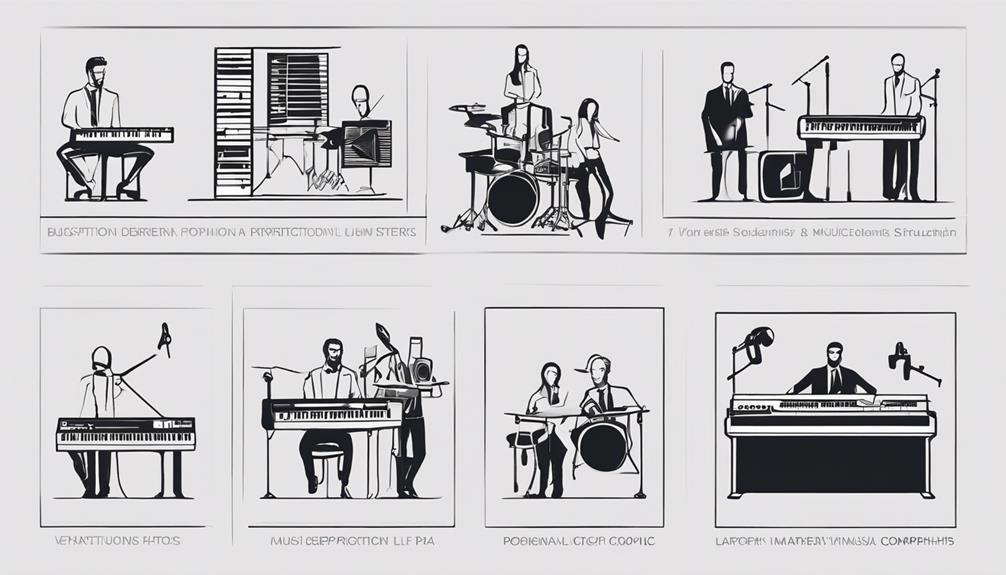
Choose the appropriate business structure for your music production company based on your specific needs and goals, considering factors like liability protection and taxation. Your options include sole proprietorship, partnership, or corporation.
Each structure comes with its own set of advantages and disadvantages that can have a substantial impact on the legal and financial aspects of your company. When making this decision, think about aspects such as liability protection, taxation implications, and management flexibility.
It's important to tailor the chosen structure to meet the unique requirements of your music production company, taking into account future growth and scalability. Remember that the business structure you opt for will dictate how your company is taxed, how profits are distributed, and the extent of personal liability you may be exposed to.
Make an informed choice that aligns with your long-term vision for the business.
Obtain Licenses and Permits

Before launching your music production company, make sure you have a legal requirements checklist in place. Licensing and registration are essential steps to legitimize your operations.
Don't forget to go through the permit application process to cover all necessary aspects of your business.
Legal Requirements Checklist
Guarantee compliance with legal requirements by obtaining the necessary licenses and permits for your music production company. To legally use copyrighted music in commercial productions, secure a license from the Copyright Office.
Even for non-commercial music production, it's essential to adhere to copyright laws. Additionally, make sure you have a business license from state and local authorities to operate legally.
By obtaining the required licenses and permits, you not only abide by regulations but also safeguard your business from potential legal issues. Remember to acquire permits for specific music production operations, such as filming in public spaces or hosting events.
Being proactive in obtaining all necessary licenses and permits will demonstrate your commitment to operating your music production company within the bounds of the law.
Licensing and Registration
Begin the process of establishing your music production company by obtaining the necessary licenses and permits, ensuring legal compliance for your operations.
To legally use copyrighted music in commercial projects, you must obtain a license from the Copyright Office. For non-commercial music production, it's vital to verify local regulations as licensing requirements may vary.
Additionally, secure a business license from both state and local governments to operate your music production company within the bounds of the law. Ensuring compliance with licensing regulations is paramount to avoid legal complications and safeguard your business's interests.
Remember to acquire any essential permits for music production operations, such as filming permits for on-location shoots. This won't only guarantee smooth operations but also ensure that your activities are conducted lawfully.
Permit Application Process
Research and identify the specific licenses and permits required for music production in your state and locality to guarantee legal compliance for your business operations.
Start by obtaining a license from the Copyright Office for commercial music production to verify proper usage of copyrighted material.
Additionally, secure a business license from the appropriate government authorities to operate your music production company within the legal framework.
It's essential to adhere to all licensing and permit regulations diligently to sidestep potential legal issues and penalties that could jeopardize your operations.
Remember to acquire any additional permits that may be necessary for your music production activities, such as noise permits for recording studios or event permits for live performances.
Acquire Production Equipment
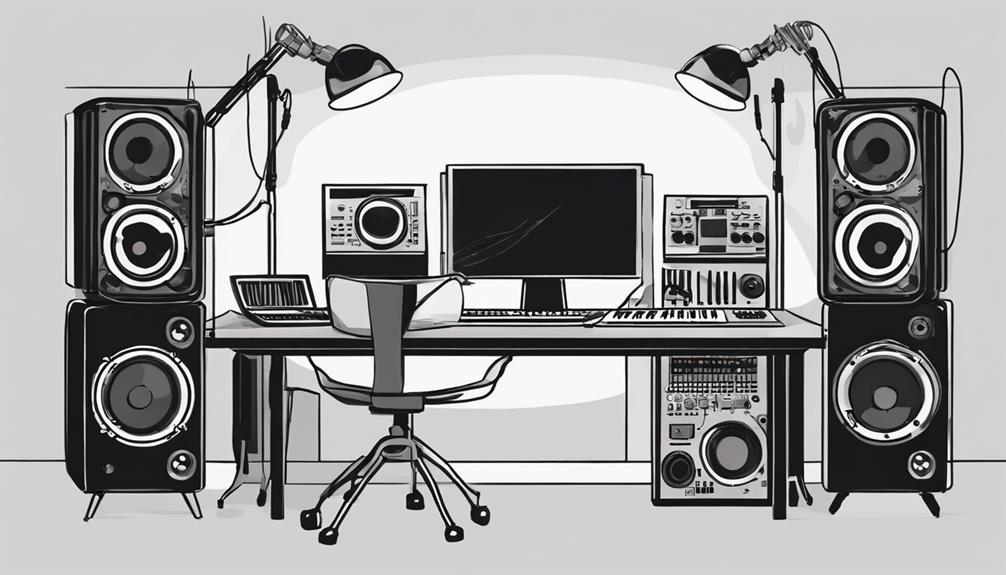
To establish a successful music production company, procuring high-quality recording equipment is essential for achieving professional sound production. Start by investing in key items like microphones, mixers, and audio interfaces to capture high-fidelity audio.
Enhance your studio setup with studio monitors, headphones, and acoustic treatment to guarantee accurate sound monitoring and mixing. Additionally, acquiring software tools such as digital audio workstations (DAWs) and plugins is vital for editing, mixing, and mastering music tracks efficiently.
To expand your creative possibilities, consider purchasing musical instruments, MIDI controllers, and sample libraries. These tools can add depth and variety to your productions.
Furthermore, explore equipment rental options for specialized gear or unique project requirements to manage costs effectively. By assembling a diverse range of production equipment, you can elevate the quality of your music productions and provide a professional service to your clients.
Establish Recording Locations

Choose strategic locations for recording that align with your production goals and technical requirements, guaranteeing ideal acoustics and functionality. When selecting a recording location, prioritize factors such as acoustics, available space, and equipment needs.
Consider renting a professional studio for access to specialized gear and a controlled environment, or opt to set up a home studio for more flexibility. Regardless of the location chosen, make sure that it's properly soundproofed to minimize external noise interference and maintain the quality of your recordings.
Invest in high-quality recording equipment and software to enhance the sound production process. Collaborate with artists, producers, and engineers to optimize the recording locations for creativity and efficiency.
Marketing Strategies

When establishing your music production company, it's essential to focus on online presence strategies and target audience identification.
By understanding where your audience spends time online, you can tailor your marketing efforts effectively.
Identifying your target audience will help you create content and promotions that resonate with them.
Online Presence Strategies
For a successful music production company, establishing a strong online presence through strategic marketing strategies is essential. Start by utilizing social media platforms like Instagram, Facebook, and Twitter to showcase your work and engage with your audience. Interacting with followers, sharing behind-the-scenes content, and posting about projects can help boost your online presence.
Additionally, create a professional website that highlights your services, portfolio, client testimonials, and contact information. This will attract potential clients and provide a platform to showcase your expertise. Implementing search engine optimization (SEO) techniques on your website is vital to improve visibility and ranking on search engine results pages, driving more traffic to your site.
Collaborating with influencers, musicians, and industry professionals can also expand your reach and attract new clients.
Target Audience Identification
Understanding your target audience is vital for developing effective marketing strategies for your music production company. To identify your target market, utilize surveys, focus groups, and observations to gain insights into their preferences.
By understanding their preferences, you can tailor your marketing strategies to resonate with your audience effectively. Additionally, it's important to determine your target market's spending habits to align pricing and promotional strategies accordingly.
Conducting market research will help you grasp consumer needs and wants, guiding both product development and marketing efforts. Based on these research insights, develop targeted marketing strategies to effectively reach and engage with your audience.
Utilize data-driven approaches to identify and connect with your target audience, enhancing your business growth potential. By focusing on understanding and catering to your target audience, you can create a strong foundation for successful marketing initiatives within your music production company.
Build Industry Connections

To effectively build industry connections in the music production field, attending events like music festivals and conferences is essential for networking with professionals. These gatherings provide valuable opportunities to meet industry insiders, establish relationships, and showcase your expertise.
Joining music production associations and groups is another effective way to connect with like-minded individuals and potential collaborators who can help you expand your network. Utilizing online platforms such as LinkedIn and music production forums can also be instrumental in broadening your industry connections.
Collaborating with established musicians, producers, and songwriters not only enhances your skills but also helps you build strong relationships within the music industry. Additionally, building a strong presence on social media platforms to showcase your work can attract industry professionals and potential clients.
Develop Project Pipeline
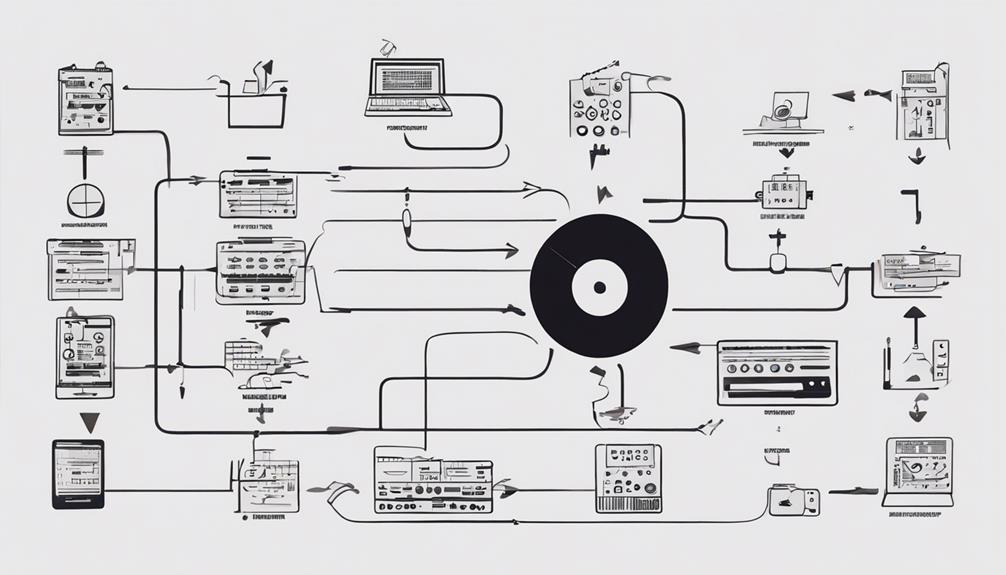
Developing a structured process for generating and managing project ideas is vital to maintaining a consistent flow of work for your music production company. By collaborating with writers, composers, and artists, you can create unique and engaging music projects that resonate with your target audience. It's essential to prioritize projects based on factors like feasibility, market demand, and potential return on investment to guarantee the success of your company.
Securing intellectual property rights for all project ideas is paramount to protect your company's creative assets and maintain a competitive edge in the industry. Regularly reviewing and updating your project pipeline allows you to adapt to changing market trends and seize new opportunities swiftly. This agile approach ensures that your music production company remains innovative and profitable in a dynamic industry landscape.
Stay proactive and strategic in managing your project pipeline to drive the growth and success of your business.
Frequently Asked Questions
How Do I Start My Own Music Production Company?
Start by securing licenses and permits, determining your music genre and required equipment. Choose a business structure, develop a detailed plan, and explore funding options. Lay a strong foundation for your music production company by following these essential steps.
How Do I Start My Own Production Company?
Starting your own production company? Immerse yourself completely! Research, plan, register, build relationships, and market fiercely. Success isn't just a dream; it's a choice you make every day. Take the leap and own it!
How Do You Make Music Production Step by Step?
To make music production step by step, first choose a genre and invest in quality equipment. Collaborate with musicians, secure licenses, and build an online presence. Create original music with passion and professionalism, and watch your production company grow.
Do I Need an LLC as a Music Producer?
You should consider forming an LLC as a music producer. It offers personal asset protection, separates finances, and adds credibility. The LLC structure simplifies operations and provides a clear legal foundation for your music production business.
Conclusion
Just like a musician creates a masterpiece with each note, creating a music production company requires careful planning and execution. By following these steps, you can lay the foundation for a successful business that harmonizes with the needs of the industry.
Remember, the journey may have its highs and lows, but with passion and perseverance, you can compose a symphony of success in the world of music production.
Keep chasing your dreams!

